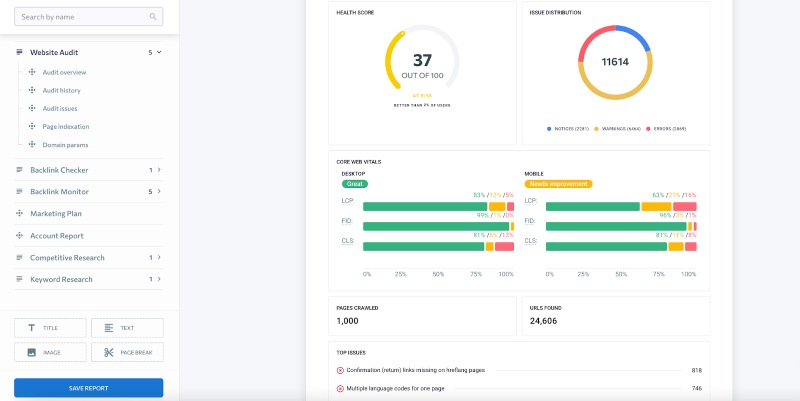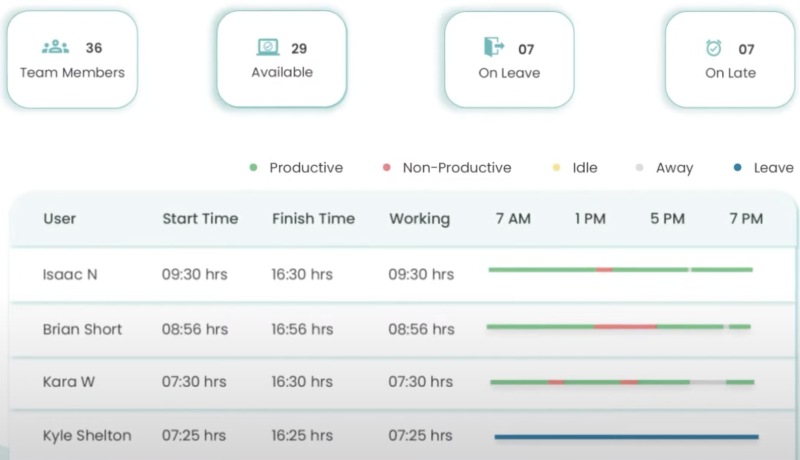Enhancing SEO Reporting with Time and Productivity Tracking
Interaction with clients in SEO agencies or outsourced SEO specialists does not always go smoothly.
The reason is simple: only some employees know how to prepare a good SEO report and make this process productive. Of course, monthly SEO reports can be done in different ways and with different efficiency styles, yet simply talking about work done is a separate skill every SEO expert needs.
If left unmastered, high risks include breaking the contract, misunderstandings with the manager, and even failures in work that can happen because of insufficient time. We will tell you how to avoid such problems and how to incorporate time and productivity tracking in the SEO reporting process.
Why is SEO Reporting Important?
SEO reporting is critical for an effective marketing campaign. It allows you to evaluate the effectiveness of the SEO strategy and detect areas requiring improvements. Perfect SEO reports provide an opportunity to:
- Evaluate the current state of the project.
- Analyze statistics of site traffic and change of indicators over time.
- Analyze rankings, conversion rates, and other vital metrics.
- Detect problems related to content and backlink profiles.
SEO report for a client is an important document that presents the work results for the previous reporting period. In addition, it may contain information about the dynamics of the project development and propose an action plan.
Ideally, the SEO report should leave the client with no questions about service quality. This document is important for the client and for systematizing the SEO expert’s work.
Here are the benefits for both parties.
| Benefits for the client | Benefits for SEO-specialist |
|---|---|
|
Control
over
site
optimization
progress
|
Demonstration
of
completed
work
|
|
Confirmation
that
funds
are
spent as
intended
|
Recommendations
to
improve
performance
|
|
Quality
control
of the
SEO
specialist’s
work
|
Long-term
task
planning
|
|
Deciding
whether
to
continue
cooperation
|
Analyzing
the
situation
in the
niche,
positive
results,
and
possible
problems
|
How to Create a Good SEO Report
There is no single standardized template for a website report, as each project has unique characteristics. Consequently, there are no rigid mandatory components.
Essential SEO Metrics that Should be in SEO Report
Creating a solid SEO report requires focusing on the following key metrics that reflect your website’s performance.
- Keyword rankings: Keyword rankings tell you how well your target keywords perform in search engine results. Pay attention to those climbing the ranks. These often represent quick wins that can significantly boost traffic with a little extra effort.
- Organic traffic: You need to know how many visitors are coming to your site, where they’re coming from, what pages they’re landing on, and how long they’re staying. This data can reveal which content is resonating with your audience and which areas might need improvement.
- Backlinks: You must pay special attention to backlinks to improve your site’s authority and ranking. But remember, the quality and relevance of those backlinks matter much more than the quantity.
- Website health score: This metric gives you a snapshot of your site’s overall technical condition. It comprises issues like broken links, slow load times, and mobile friendliness.
- Conversion rate: Conversion rate tells you how well your SEO efforts drive the actions that matter most, like purchases or sign-ups.
- Google Business Profile metrics: These metrics provides insight into how your local SEO is performing, including how often people find your business in local searches and their following actions.
Note: SEO reports should serve as a tool to assess the project’s current state. In addition, consider your competitors’ activities, which can affect the site’s visibility.
Common Pitfalls in Poor Quality SEO Reports
Poor-quality SEO reports often fall short by focusing too much on vanity metrics while ignoring actionable insights. It is known that you can learn from the mistakes of others. That’s why we’ve analyzed and collected the three common shortcomings in SEO reporting.
One common pitfall is the existence of data silos. It happens when different pieces of information are scattered across multiple platforms or reports. This makes it hard to get a cohesive view of your SEO performance. As a result, your SEO report looks like a set of fragmented strategies. It doesn’t address the whole picture.
Another issue is time inefficiency. If your report takes hours to compile but doesn’t offer new insights, it’s not worth the effort. SE Ranking, with its SEO report generator, can help.

It is one of the SEO reporting tools that has unlimited templates. Each white-label SEO report template can be easily adjusted per the distinctive “appetites” of each customer. With the SE Ranking SEO report generator, you can manually send reports or schedule automatic deliveries. When automating SEO reports, you save time and gain the ability to pay attention to more acute areas of your work.
Lastly, beware of reports lacking comprehensive insights. A good SEO report should not just present data but also interpret it.
Suppose your SEO report is just a collection of numbers without context. In this case, it’s missing the point. The goal is to understand what the data means for your business. Stakeholders must understand how to use this data to improve SEO strategy.
Introduction to Time and Productivity Tracking
The time management method is based on strategic planning and a sequence of actions aimed at achieving specific goals.
Understanding Time and Productivity Tracking
Effective time and productivity tracking plays a determining role in achieving success in the highly competitive, fast-paced SEO industry. The complexity of projects in this area, often requiring high precision and thoroughness, underscores the importance of time tracking.
The lack of a systematized approach to time and productivity tracking will result in SEO project delays, unforeseen disruptions, reporting frequency noncompliance, and additional resource costs. In such an environment, proper time allocation between tasks becomes critical in achieving success and excellence in SEO.
Popular Tools and Methods
Many productivity monitoring tools make this process straightforward and efficient. Make sure that they integrate well with project management platforms like Trello and Asana. Time Champ, Toggl are some of the most popular options. These project time-tracking tools are known for their user-friendly interfaces and robust feature sets:
Time Champ is a time-tracking software that stands out by offering a more comprehensive approach to time and productivity tracking. It provides detailed insights into how time is spent on individual tasks and across entire workflows. Time Champ also includes advanced features like automatic time capture, productivity analysis, and employee monitoring.

Toggl offers simple time tracking with options to break down tasks by project, client, or category. It’s ideal for teams who need to track billable hours. It is also awesome for those who want to analyze how time is distributed across different SEO activities.
Productivity measurement techniques such as the Pomodoro Technique or time-blocking can be used to maintain focus on deep work tasks, such as writing content or analyzing SEO data. These methods help minimize distractions and ensure time is spent on high-value activities.
Review and Track Progress Regularly
Tracking time and productivity is only half the battle. Regular reviews are essential to make this data actionable.
Scheduling weekly or monthly reviews allows you to assess your progress toward SEO goals and make necessary adjustments. During these reviews, look at how time was spent and whether it aligned with your objectives. Are tasks consistently taking longer than expected? Are you dedicating enough time to deep work — those focused, uninterrupted sessions crucial for tasks like developing SEO strategies or conducting in-depth audits?
The Intersection of Time Management, Productivity, and SEO Success
Now, let’s discuss three central benefits time and productivity bring to SEO reporting.
Enhancing Workflow Efficiency
Every minute counts in any industry. By closely monitoring how time is allocated across tasks, teams can identify bottlenecks and streamline their workflows. This process reduces the time spent on low-value tasks like redundant keyword checks or excessive reporting. The result is a more efficient workflow, where the team’s energy is directed toward tasks that genuinely move the needle.
Increasing Trustworthiness and Clarity
When time and task completion are tracked transparently, it clearly records what has been done and how long it took. This transparency helps clients understand the value.
Data-Driven Decision Making
If you notice a particular SEO tactic takes up significant time but delivers minimal results, it’s a signal to reallocate resources to more fruitful strategies.
Conversely, high-performing activities can be scaled up for greater impact. This approach ensures that your decisions are backed by solid data, leading to more optimized, successful SEO campaigns.
Step-by-Step Guide to Integrating Time and Productivity Tracking with SEO Reporting
We have prepared a three-step guide on how to integrate time and productivity tracking in your SEO work.
Setting Up a Workflow
Integrating time and productivity tracking with SEO reporting begins with setting up a clear workflow. Start by choosing the right tools to track time spent on tasks and overall productivity.
Once you have your tools, create a detailed project plan that outlines each SEO task, its expected duration, and its importance to the overall campaign. Assign these tasks to team members and ensure everyone understands the tracking process.
Regular check-ins can help ensure the workflow is followed and any adjustments are made in real time.
Defining Relevant Metrics and KPIs
Next, defining the KPIs that will guide your tracking efforts is essential. These KPIs should reflect SEO effectiveness and productivity. For instance, you might track:
- Time spent on content creation versus the organic traffic generated by that content.
- Number of backlinks acquired per hour of outreach.
- Conversion rate improvement per hour spent on on-page optimization.
Align these KPIs with your overall SEO goals to ensure you’re measuring what truly matters.
Reporting and Analysis
Finally, integrate the tracked data into your SEO reports. Include traditional SEO metrics and insights into how time and resources were allocated. For example, if your team has spent significant time on technical SEO improvements, highlight how this effort correlated with improved site speed and, subsequently, better rankings.
This approach not only improves the quality of your reports but also provides a more comprehensive view of your SEO efforts.
Conclusion
There are several key aspects to consider when creating an informative SEO report. It is important to remember that the volume of a document does not always mean its quality. It is better to create a report of ten pages but let it be useful and informative. In addition, you should consider the dynamics of the project’s optimization, including statistics for the current and previous periods, to compare results.
As mentioned above, incorporating online time-tracking solutions saves time and efficiency. You can also use a ready-made SEO report template and specialized services to automate the process of creating SEO reports.






